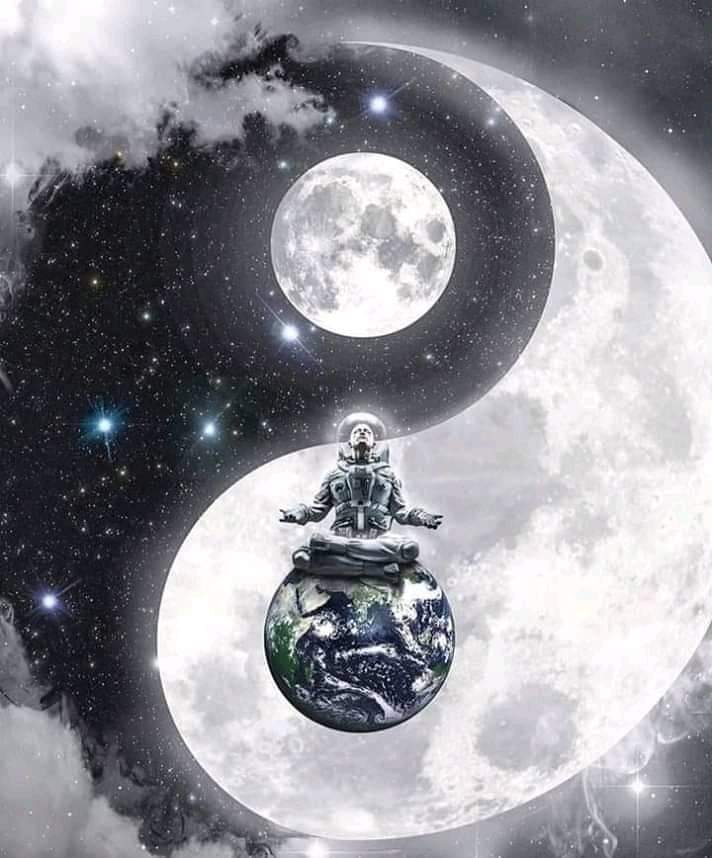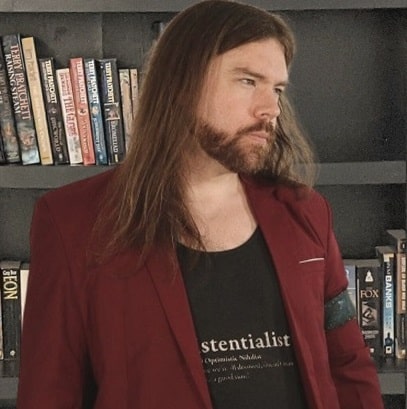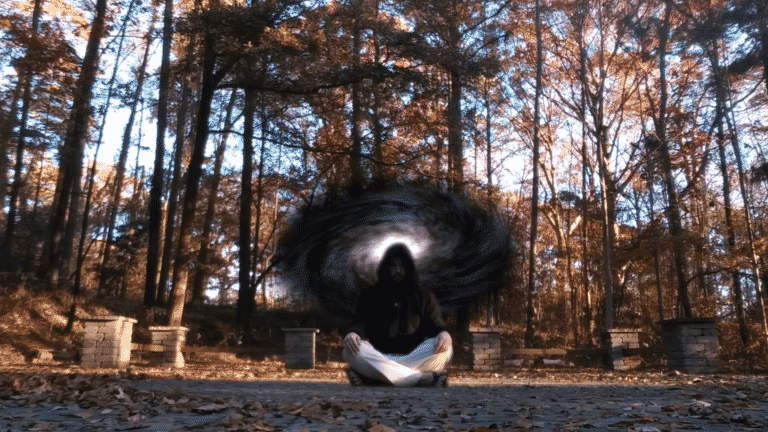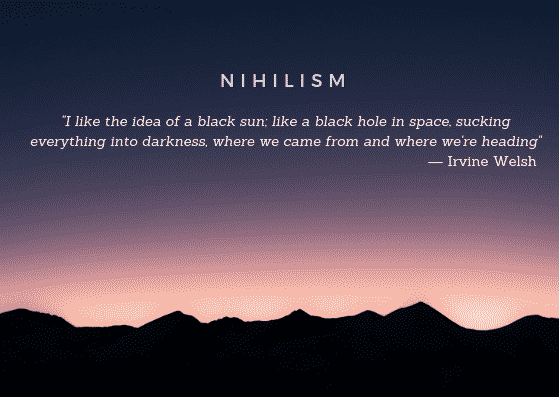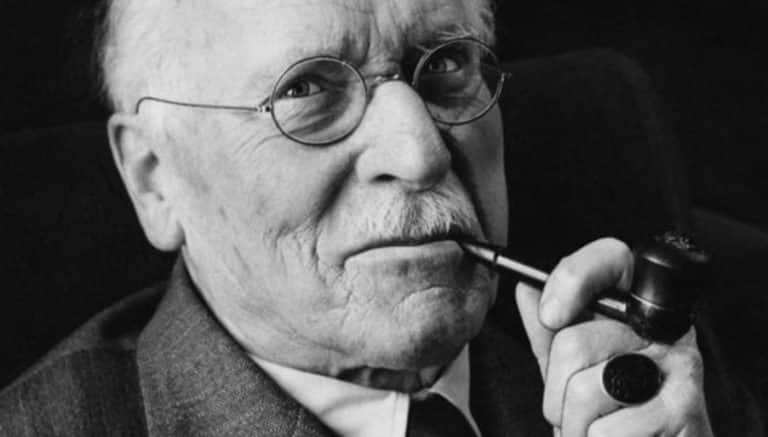Defining the Terms of Modern Nihilism
Nihilism is often used as a buzzword in this day and age, and, like so many things, is often strewn around as an empty pejorative, completely devoid of meaning, rather than a specific philosophical concept that requires an intense education of supporting material to fully understand. Don’t like a legal ruling? Well, jeez, it’s legal nihilism. Don’t like a political viewpoint? It’s political nihilism. This is all utter nonsense. You might call it… linguistic nihilism.
Not even mentioning the philosophical branches and offshoots of nihilism from existentialism to absurdism and more, nor taking the time to parse Nietzsche’s actual viewpoints on nihilism, which are not only chronically misinterpreted, but also almost 150 years old, I wanted to take the time to define some of the terms used on this website in reference to nihilism in a simple, introductory fashion.
There are four key terms to understand that come up over and over again, and the ones you’ll most commonly hear are digital nihilism and spiritual nihilism. Altogether, these four terms are: nihilism, post-nihilism, digital nihilism and spiritual nihilism.
Unlike the bandied about pejorative nihilist label used often in the media, these terms have actual definitions.
Nihilism is the assertion that in an infinite universe, life has no objective meaning, but does have subjective meaning, and the authoritarian moralism enforced by religious dogmas masquerades as objective meaning by defining cookie-cutter meaning for its denizens by means of authority. When this veil is lifted, people understand that the meaning provided for them be external forces is not divine, but is a form of institutional control. This does not negate divinity; it negates dogma and authority. This is a good thing.
If you’ll recall the film The Truman Show, which you can read as a nihilist parable, Truman is utterly controlled by an external, paternalistic authority figure who promises him order and safety in exchange for following his rules and living life within the bounds of his definition; “freedom” in the end, is leaving this coddled existence behind and walking through a bleak, black door into the unknown. It is like crossing a threshold into adulthood and taking on the responsibility of defining meaning and reality for oneself.
This can be scary, and crushing, and this is a stage of nihilism. Reality is infinite, life is suffering, and the bubble of safety provided by paternalistic dogma is not only illusory, but predatory. The responsibility of defining one’s own meaning is intense, and requires competent internal reflection and accrual of diverse life experience leading to self-actualization and wisdom.
The realization of nihilism, which is not a belief system, but simply a realization that the reality of the universe is infinite and dogma is little more than someone else’s branded attempt at promoting their own solution to nihilism, often manifests as a bleakness. A depression. A feeling of being lost in the vastness of it all. A lack of control that one must come to terms with.
Some media that illuminates the concept of nihilism: Fight Club, Gone Girl, Rick and Morty, The Truman Show, and many more. What these media share is the assertion that the system is a prison, but what lies beyond it is unknown, infinite and unpredictable, the unknown is scary, and that is its power. The system must be escaped, but what could replace it is, as of yet, unknown and undefined.
Post-Nihilism, which Nietzsche referred to as “active nihilism” is the beginning of managing one’s own existence and taking responsibility for it. This comes from beginning the quest for self-actualization and the search for meaning. Some may return to religion at this stage, but it is more of a homecoming, less rooted in ideological brainwashing and more rooted in freedom of choice.
However, post-nihilism, regardless of its manifestation, is about finding one’s source of subjective meaning. Because this meaning is fundamentally subjective and stems from perspective and perception stemming from limited exposure of both to one’s own being and the infinity of reality, it eschews dogma and proselytization, because it respects that paternalism, which it had already escaped, provides no answer to subject meaning in the way that choice, even if that choice is to return to the paternalistic, dogmatic bubble, does. It does not necessitate returning to any kind of organized religion as meaning could be found in a multitude of places: finding and appreciating both natural and manmade art; expanding the horizon of human knowledge; doing good deed for others; and so on and so forth.
Post-Nihilism often manifests as a sort of happysad. A recovering from depression. Light emerging from dark clouds. “It’s all going to be okay after all.” This is where I think nihilism gets a bad rap in modern society. Because the institutions of religious dogma are ever-shrinking in relevance, especially given their now incontrovertible history of raping children, waging war, stealing from the poor through indulgences, suppressing science to maintain power and authority, and manipulating politics, people have the nihilist realization, but because of modern wage slavery, consumerist and tribalist dogmas (“your value is your ability to consume and you social status”), people have traded one paternalistic authority for, arguably, a worse one, rather than moving onto the next stage of nihilism, which is post-nihilism, an activity that requires freedom of thought, freedom of expression, freedom of travel, and autonomy over one’s time and decisions.
To return to the Truman Show analogy, if Truman left the safety of the paternalistic bubble and was immediately captured by slavers who forced him to work for $8 an hour at a Walmart, he might relent to the rationalization used to justify the paternalistic bubble that he correctly deduced was an exploitative prison; but if, instead, he was able to explore his own autonomy, he would enter the phase of post-nihilism. This, not the breakdown of religious dogmas, is the problem of modern society; people lack the means to competently explore their own autonomy and self-actualize.
Post-Nihilism embraces the unknown and embraces the search for meaning in it. In terms of vibe, it has a focus on wonder and imagination. In an infinite universe of infinite possibility, what is beautiful is both what can be discovered within it (wonder) and what can be made out of it (imagination).
Some media that illustrates post-nihilism: Amelie, Willy Wonka and the Chocolate Factory, Alice in Wonderland
Digital Nihilism is the beginning of creation of the malleable, infinite reality. It eschews the concept of a cosmic plan and sees the infinity of reality as something that is molded by reality. It begins to have a defining characteristic: that reality is a sandbox that can be molded into heaven and be made into something of wonder and imagination. Digital nihilism sees life as a journey, or as a themepark ride, determines this ride should be as amazing, satisfying and meaningful as it can possibly be, and tries to engineer the structure of that in the real world. It is called “digital” nihilism, both because it is touchable/tangible and because it recognizes reality is painted by technology.
Digital nihilism is embraces the fullest understanding of science and the laws of the natural world and seeks to use them to heighten the experience of the ride and to reduce suffering. It seeks greater and greater opportunity for wonder, autonomy, meaning and exploration by means of seeking to paint the natural world through manipulating the inherent rules of the natural world.
Space travel is digital nihilism. Virtual reality is digital nihilism. Terraforming and geo-engineering are digital nihilism. Artificially disrupting the ecosystem to preserve plants and animals is digital nihilism. Genetic modification is digital nihilism. Overcoming death via merging consciousness to technology. So on and so forth. And through the reality-bending of digital nihilism, people learn new things about the world and its true infinity.
True infinity, such as multidimensionality in terms of 4th dimensional time (quantum entanglement/many worlds theory), in terms of 5th dimensional ascendant and descendant dimensions (simulation theory, man-made virtual reality) and in terms of 6th dimensional diagonal dimensions (the layer of reality that makes it possible for ascendant and descendant dimensions to exist).
True infinity, such as the metaphysics of consciousness, such as: functions of being and behavior – id, ego, superego; levels of consciousness sophistication, functional permissions of consciousness; conscious, unconscious, collective unconscious; technological proof of dualism by means of the extradimensionality of consciousness, either by transferring and adapting to ascendant/descendant worlds or by being transferred from one material vessel to another.
Some media that illustrates digital nihilism: The Matrix, Ready Player One, Mr. Robot
Spiritual Nihilism which is, at the fullest understanding of the true infinity of the universe, understanding oneself and self-actualizing within that framework, where reality is made both infinitely malleable and infinitely navigable by means of digital nihilism.
It seeks a true understanding of self in the context of knowing that ego is a framework of a singular dimension among an infinite tapestry of dimension. It seeks full satisfaction from life by understanding the cravings of the soul and picking the correct reality for itself to be fulfilled. It is the full actualization of the self and of freedom, and it requires tremendous self-knowing. It recognizes its own limited perception and makes peace with the fact that true reality is infinite, unknowable, and not discernably different from imagination, since imagination has been materially manifested by digital nihilism. It understands that its limited perception, no matter how vast, makes reality individualistic and thus, collective insofar as individualistic reality can be shared, and that every living and unliving thing manifested in reality is a collective unit of similar matter, vibrating and trying to achieve its own self-actualization, whether a toaster at the turn of the century trying to self-actualize into the best toaster, or a time-traveling, spacefaring, reality-bending human from 3033.
Spiritual nihilism understands the human systems of the soul, which religious dogmas have preyed on and dictated their interpretation be accepted as a means to achieve power. Very real concepts of oneness, dharma, ego death, reduction of suffering, presence, and so on, intuitively understood.
In a manner of speaking, you could say spiritual nihilism has no place for paternalistic religion because everyone in that framework is capable of interpreting and navigating the system of the soul on their own. Fully realized spiritual nihilism is a future where all people are individually enlightened, because they have full access to all the freedoms of the universe, competency to self-reflect, and freedom from material burdens (scarcity, imprisonment/enslavement, death). Everyone is competently making, and sharing, their own brand of personal religion that is tailored to them and provides them the meaning necessary for fulfillment and satisfaction in life.
Some media that illustrates spiritual nihilism: The Midnight Gospel
Influential related philosophers, scientists and theologians worth reading: Alan Watts, Carl Sagan, Friedrich Nietzsche, Carl Jung, Terence McKenna, Rumi, and many, many more.
This has been an introduction. If you thought this was dense, I didn’t even mention the wave function, the collective soul, or chaos theory, so you got off pretty easy. This is just a definition of terms.
I want to go back to The Truman Show for just a minute, because we’re at that time now, we’re at that time when we’ve begun to leave the paternalistic bubble, and we’re discovering the world is scary. The allure of going back home, to simpler times, when a man in a white robe tells you what to believe and you nod along and pay him a percentage of your wages which he uses to implement a horrific agenda of control and domination, and you go home to prepare for another day of being told what to do by someone richer and therefore, for some reason, more autonomous and capable of manifesting their dreams than you. A life of being promised that when all the abuse is over, your dreams await you.
Or you can trust in your own autonomy and try as best you can to work toward shedding every prison in this universe that keeps you from making your dreams a reality here. Now. Working, in the challenging periods of post-nihilism and digital-nihilism to make that a possibility for the future.
That’s nihilism. The best part of it is that no one rapes you, robs you or enslaves you, metaphorically or otherwise. It is, at its core, a philosophy of freedom.
Ryan Night out.

